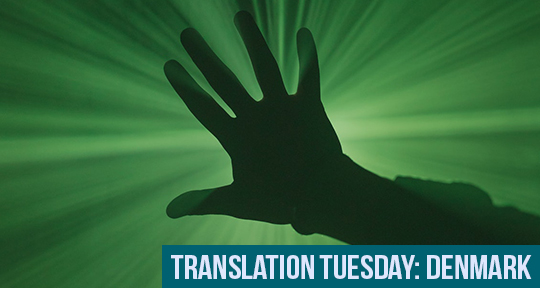When the coronavirus struck Denmark in the early months of 2020, award-winning poet Caspar Eric adopted the practice of writing a poem a day for eighty days. Published eventually in Danish as I Will Not Go Back (Gyldendal, 2020), Eric’s practice finds in poetry the potential for serving as a mode of immediate witness to the unfolding of pandemic time and its political contexts. This Translation Tuesday, Matt Travers translates the poem Eric had written on Day 56, which eulogises the suicide of the Danish-Palestinian poet and political activist, Yahya Hassan, whose writing is praised for attesting to the link between “local violence with global violence” in his nominee citation for the 2020 Nordic Council Literature Prize. Written in one long, unbroken stanza, Eric’s voice pulses with a sharp political grief, and is a moving document to Hassan’s enduring legacy in literature as in politics.
DAY 56 228 hospitalised
I have to remind myself
that the crisis is here,
I cannot just
jump on the train to Aarhus.
They streamed Yahya’s funeral
on ekstrabladet.dk,
my thoughts are with his family,
my thoughts are with his loved ones.
And fuck those idiots
who whined on Facebook
about people not appearing
to keep proper distance.
Even on the day of mourning
Muslims are being shamed.
The racist narratives
lurking under the LCD,
fuck those people,
fuck their logics.
A hand in the air
for the poems of the impossible,
it is impossible to aim
towards the sentimental
without limiting
a boy to a poet
or to limit
the poet to a boy.
Nothing will ever be
the same again.
The moon’s corona
shone spiteful and beautiful.
I hammered down on the table,
dull tears,
in his own “Moonpoem,”
as salve and salvation,
he would not be killed
for nothing.
No, no one should die
for the majority’s peace.
I can say nothing
that he himself
couldn’t say better,
say angrier,
underneath his fury
a furious love.
I have already
quarreled with Ada
about what we can say
how it should be said.
It is a poor consolation
that everything has now changed.
What I miss
is also a young
human’s future,
the violence in the poems.
But the violence in the poems
is not only of the poems,
they are also the boy’s
and also his hands.
Everyone wants
A more real reality;
windows in the forehead,
concrete in the mouth.
Then they complain of the pain,
then they want it raw.
In with the shit
in the broken literature,
as long as the break
remains in the lines,
so we can stand on the sides
and clap very softly.
In these lonely minutes
it is a Brøndby fan,
let’s just call him Pervez,
who is my biggest ally.
Now we must lay
the identities in a coma,
try to find
a community
while the fire still
burns wildly.
Never let it go out,
never let it heat up.
Never let it heat up
a political project
if the project isn’t
also of doubt,
also of poetry,
like smoke forcing itself
down in the lungs,
forcing them to hack up
new melodies
in the petrified voices.
Translated from the Danish by Matt Travers
Caspar Eric was born in 1987 and studied Comparative Literature at the University of Copenhagen. He has written five collections of poetry (7/11, Nike, Avatar, All What You Own, and I Will Not Go Back — Poems from the days with COVID-19), and written a well-received experimental pop adaptation of Shakespeare’s Hamlet (#amlet). Nike, his long autobiographical poem whose starting point began with his own handicap and which reflects on the value of living with a disability in a hyper-mediated society, won the Danish Michael Strunge Prize, and Sherilyn Hellberg’s English translation won the Leif & Inger Sjöberg Award from the American-Scandinavian Foundation. Eric’s fifth collection, I Will Not Go Back — Poems from the days with COVID-19, published in November 2020, aimed to outlast the COVID disaster with one poem a day for the first eighty days. He has also translated Tao Lin’s Shoplifting from American Apparel into Danish.
Matt Travers is a writer based in Aarhus, Denmark. He has published poetry, reviews and translations with 3:AM Magazine, Zarf Poetry, Overground Underground, Firmament, and is currently working on the English translation of Søren R. Fauth’s Moloch: The Story Of My Rage.
*****
Read more from Translation Tuesday on the Asymptote blog:

